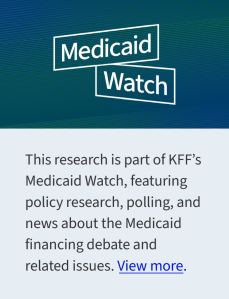The Debate About Enhanced Premium Tax Credits Begins to Emerge (Finally)
 With the focus on Medicaid cuts, the dismantling of the Department of Health and Human Services and so much more that has been part of the “flood the zone” tactics of the Trump administration, one big health policy issue—the looming expiration of the enhanced Affordable Care Act (ACA) tax credits—has not received the attention it deserves. That may be changing soon. A story first published in The Hill spotlighted a conservative Republican ad buy in several states urging Republicans on Capitol Hill to act on extending the tax credits. It could be the beginning of a more concerted effort to coax Republicans in Congress into action on this issue before the credits expire at the end of the year, or even before rate filings are due to be submitted to state and federal exchanges this summer. The reason: to address the needs of their constituents and avoid paying a price at the ballot box in the midterms when premiums spike for the 24 million people who rely on Marketplace coverage today.
With the focus on Medicaid cuts, the dismantling of the Department of Health and Human Services and so much more that has been part of the “flood the zone” tactics of the Trump administration, one big health policy issue—the looming expiration of the enhanced Affordable Care Act (ACA) tax credits—has not received the attention it deserves. That may be changing soon. A story first published in The Hill spotlighted a conservative Republican ad buy in several states urging Republicans on Capitol Hill to act on extending the tax credits. It could be the beginning of a more concerted effort to coax Republicans in Congress into action on this issue before the credits expire at the end of the year, or even before rate filings are due to be submitted to state and federal exchanges this summer. The reason: to address the needs of their constituents and avoid paying a price at the ballot box in the midterms when premiums spike for the 24 million people who rely on Marketplace coverage today.
The enhanced credits were originally established under the American Rescue Plan in 2021 then extended through 2025 by the Inflation Reduction Act. They helped more than double enrollment in the exchanges, to about 24.3 million in 2025. That’s a fraction more than the number of people who benefit from Medicaid expansion. The legislation made expanded credits available to low-income people earning between $15,060 and $60,240, as well as, for the first time, to more middle-income people earning more than that who were previously ineligible. The enhanced credits are set to expire this year unless they are extended by Congress. If Congress does nothing, they disappear.
 Twenty-four million is a big number. Just as important politically, it represents several groups with varying needs who traditionally have mattered to Republicans.
Twenty-four million is a big number. Just as important politically, it represents several groups with varying needs who traditionally have mattered to Republicans.
- The enhanced credits spurred enrollment growth in the red states that have not expanded Enrollment grew 255% in Texas and 147% in Florida from 2020 to 2025, giving these states an outsized stake in Congressional action to extend the credits.
- Small businesses are a traditional Republican constituency and many Marketplace enrollees are self-employed. An analysis from the Treasury Department found that 3.3 million Marketplace enrollees (28%) were small business owners or self-employed in 2022 (and the Market has grown substantially since then). A KFF analysis found that 38% of Marketplace enrollees with incomes over four times poverty—the group that would lose tax credit eligibility altogether if enhanced premiums expire—are self-employed.
- Rural America has been a bastion of Trump and Republican support. One estimate from California is that rural consumers will see premiums increase by 96% if the enhanced tax credits disappear (compared with 62% in urban areas).
- Democrats and Republicans have long vied for older voters, with Republicans competing favorably recently. Just over half (51%) of Marketplace enrollees who would lose tax credit eligibility are ages 50-64. If the enhanced tax credits expire, a 60-year-old couple making $82,000 (just over four times poverty) would see their premium payment triple or more in most parts of the country.
In the policy debate so far, potential Medicaid cuts have been the focus with the enhanced ACA premium tax credits taking a backseat. That’s partly because cuts in federal Medicaid spending will be larger—potentially as much as $880 billion—and will directly affect hospitals, nursing homes, the managed care industry, and states, all of whom are beginning to make their voices heard. It’s also because it takes legislation to cut Medicaid, and that legislation is a focus of media attention and debate.
In terms of their direct impact on people and the affordability of health care, however, both the Medicaid cuts and the tax credits matter. Politically, the tax credits may have even more immediate salience. Losing them will impact voters’ pocketbooks quickly. While for Medicaid, it will take some time for cuts in federal Medicaid spending to translate into actual cuts in payments, benefits and eligibility made by governors, with each governor making different decisions about how they handle federal funding cuts. It could be argued that political accountability for not extending the tax credits will fall more directly on Republicans in Congress; accountability for the Medicaid cuts, while potentially much larger, will be shared with governors, each running their own state Medicaid program often known by voters by its own name.
Finally, the Medicaid cuts and the tax credits are also connected. When people are forced off Medicaid because of spending cuts or work requirements, the Marketplaces will not be there for many of them as a viable option if the premiums are too high, or people can only afford plans with deductibles that are prohibitive for them.
